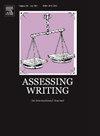Improving writing feedback quality and self-efficacy of pre-service teachers in Gen-AI contexts: An experimental mixed-method design
IF 5.5
1区 文学
Q1 EDUCATION & EDUCATIONAL RESEARCH
引用次数: 0
Abstract
The rapid advancement of Generative AI (Gen-AI), such as ChatGPT, presents both opportunities and challenges for teacher education. For pre-service teachers (PSTs), Gen-AI offers new tools to enhance the efficiency and quality of writing feedback. However, it also raises concerns, as many PSTs lack classroom experience, confidence in giving feedback, and knowledge of how to effectively integrate AI-generated content into instructional practice. To address these issues, this study adopted a pre-post experimental design to examine the effects of targeted training on PSTs’ provision of writing feedback, with a focus on feedback quality, self-efficacy, and their relationship in ChatGPT-supported contexts. Over a two-week training program with 30 PSTs, Wilcoxon signed-rank test results from the content analysis showed significant improvements in feedback quality and self-efficacy. Semi-structured interviews with eight participants identified cognitive changes and enhanced ChatGPT operational skills as key drivers of these improvements. We reaffirmed that mastery and vicarious experiences are crucial for enhancing teacher self-efficacy. Furthermore, a reciprocal relationship was observed between the quality and self-efficacy in providing ChatGPT-assisted feedback. This study contributes to the broader discourse on ChatGPT in education and offers specific strategies for effectively incorporating new technology into teacher training.
提高Gen-AI情境下职前教师写作反馈质量和自我效能:一种实验性混合方法设计
ChatGPT等生成式人工智能(Gen-AI)的快速发展,给教师教育带来了机遇和挑战。Gen-AI为职前教师(pst)提供了新的工具,以提高写作反馈的效率和质量。然而,这也引起了人们的担忧,因为许多pst缺乏课堂经验,缺乏给予反馈的信心,也不知道如何有效地将人工智能生成的内容整合到教学实践中。为了解决这些问题,本研究采用了前后实验设计来检验针对性培训对pst提供写作反馈的影响,重点关注反馈质量、自我效能及其在chatgpt支持情境下的关系。在为期两周的30名pst培训项目中,内容分析的Wilcoxon sign -rank测试结果显示反馈质量和自我效能显著提高。对8位参与者进行的半结构化访谈确定了认知变化和增强的ChatGPT操作技能是这些改进的关键驱动因素。我们重申,掌握和替代经验是提高教师自我效能感的关键。此外,在提供chatgpt辅助反馈的质量和自我效能之间观察到相互关系。本研究为ChatGPT在教育中的广泛讨论做出了贡献,并为有效地将新技术纳入教师培训提供了具体策略。
本文章由计算机程序翻译,如有差异,请以英文原文为准。
求助全文
约1分钟内获得全文
求助全文
来源期刊

Assessing Writing
Multiple-
CiteScore
6.00
自引率
17.90%
发文量
67
期刊介绍:
Assessing Writing is a refereed international journal providing a forum for ideas, research and practice on the assessment of written language. Assessing Writing publishes articles, book reviews, conference reports, and academic exchanges concerning writing assessments of all kinds, including traditional (direct and standardised forms of) testing of writing, alternative performance assessments (such as portfolios), workplace sampling and classroom assessment. The journal focuses on all stages of the writing assessment process, including needs evaluation, assessment creation, implementation, and validation, and test development.
 求助内容:
求助内容: 应助结果提醒方式:
应助结果提醒方式:


